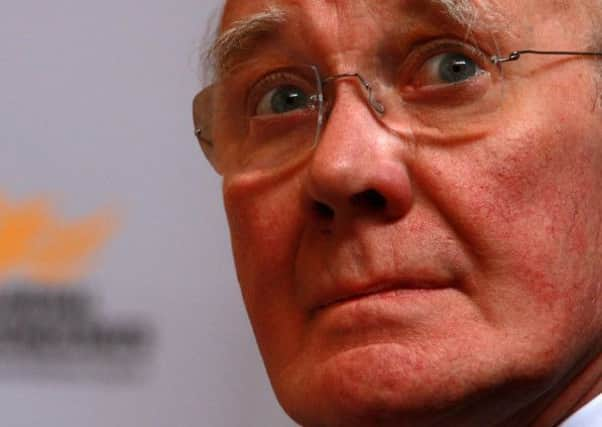Independence: Campbell calls for new powers summit


The Labour and Conservative parties have been urged to “up their game” over the new powers they want handed to the Scottish Parliament after a potential No vote on 18 September.
But independence campaigners insist there is still no guarantee of any new powers, despite the Lib Dems being in power at Westminster.
Advertisement
Hide AdAdvertisement
Hide AdA report launched by Sir Menzies yesterday says a consensus has been reached among wider civic Scotland, including all the pro-Union parties, that Holyrood should be responsible for the “majority” of its spending.
It calls for a cross-party summit to be staged 30 days after the referendum, under the auspices of Scottish Secretary Alistair Carmichael, to “secure a consensus” on more powers for Holyrood.
This agreement should then be in the Labour, Conservative and Liberal Democrat manifestos ahead of next year’s general election and included in the subsequent Queen’s Speech later that year to ensure it is quickly enacted.
Sir Menzies called on the pro-Union parties to show more urgency on the issue.
“I hope they will pick up the pace and pick up their game because as we approach 18 September, there’s obviously a need for that,” Sir Menzies said.
“My understanding and my conversations informally with senior Labour figures are that there is a majority for the view that the economic powers of Scotland need to be improved.”
The report published yesterday and entitled Campbell II, is the second report by the Lib Dems’ Home Rule and Community Rule Commission, chaired by the former party leader.
The first report called for Holyrood to be handed responsibility for raising 60 per cent of its spending, with income tax, inheritance tax, capital gains tax and the proceeds of corporation tax all devolved.
Advertisement
Hide AdAdvertisement
Hide AdIt also calls for the Scottish Parliament to be entrenched “permanently” in statute, instead of the current situation where it could effectively be disbanded by Westminster.
“This is a radical and modern programme for change based on valid and long-held principles,” Sir Menzies said.
“Think tanks, academics and leading political figures have joined the debate and it is clear that there is common ground on the reform required to the United Kingdom and to Scotland’s relationship with the rest of the UK.”
UK civil servants should now start preparing the groundwork for more economic powers to be transferred to Holyrood and the Scottish Government should assist in this, the report adds.
The “consensual approach” of the No campaign contrasts with the “totalitarian” Yes campaign which stifles any dissent from “Alex Salmond’s agenda”, Sir Menzies claimed.
“Unlike the Yes campaign, the campaign against independence is not some totalitarian outfit,” he said yesterday.
But Blair Jenkins, chief executive of the Yes Scotland campaign, said Sir Menzies was unable to specify any timetable for the changes proposed, despite his party being in power at Westminster, along with the Tories.
“Little wonder, given that Liberals have been talking about them for over a century,” Mr Jenkins added.
Advertisement
Hide AdAdvertisement
Hide Ad“In the absence of being able to give any guarantee at all to Scotland of more powers, Ming Campbell preferred to indulge in silly name-calling.
“A Yes vote means the people of Scotland get the government we vote for every time, instead of the ideology-driven austerity.”
COMMENT
Ben Thomson: The plus side of delivering more power to Holyrood
FOR those of us who want to see a more powerful and responsible Scottish Parliament within the UK, the interventions by Menzies Campbell, and particularly Gordon Brown, are significant and not to be underestimated.
Gordon Brown’s speech was a further sign that those in the Labour party who are against the devo-plus agenda are losing the battle to those in favour.
Ming Campbell’s intervention represented the logical next stage in this process; that if we all agree on the basics of what devolution should look like post-referendum, then we should get together and say so. All three unionist parties have been looking at proposals for greater fiscal powers similar to our devo-plus proposal, which would result in Holyrood being responsible for raising at least half of what it spends.
These proposals should not be confused with devo-max, which is not supported by unionist parties. The cross-party Devo Plus group has constructed a document – The Glasgow Agreement – which we believe can unite the parties.
Furthermore, our polling makes clear that by uniting on a proposal for further devolution, the unionist campaign can significantly increase its referendum vote share.
Advertisement
Hide AdAdvertisement
Hide AdIt is inevitable that the pro-UK parties will not agree on every dot and comma of what powers should be devolved, but The Glasgow Agreement allows them to tell the people of Scotland the outline terms of what further devolution would look like.
The parties all say they agree with the principle of delivering more devolution – it’s time to make it happen.
• Ben Thomson is chairman of Devo Plus and think tank Reform Scotland